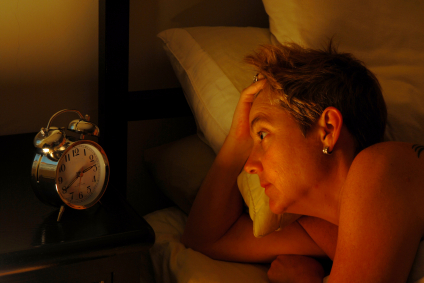There are three lifestyle factors that will help you prevent type 2 diabetes. You’re familiar with two of them—diet and exercise. You may not know about the third one. But it’s just as important.
According to new research from the Los Angeles Biomedical Research Institute, this third factor helps your body control glucose levels and prevent insulin resistance. It even affects your fat cells’ ability to respond to insulin.
If you exercise and eat a diet low in sugars and grains, you’re already doing a lot to keep type 2 diabetes away. The good news is you can lower your risk even further by doing this one easy activity. In fact, it’s not really an activity at all.
Just get enough Zzzz’s…
Sleep deprivation directly raises your risk for developing diabetes. It disrupts your insulin and glucose levels. But when you correct a sleep deficit, your blood sugar levels stabilize.1
| Tired of staring at the clock? Drink a glass of tart cherry juice. The juice helps your body naturally produce melatonin. It will help you fall asleep faster and stay asleep. It can even help you sleep longer and nap less. |
Studies show catching up may boost your body’s sensitivity to insulin. After just three nights of “catch-up” sleep, men who suffered from weekday sleep loss were able to regain control over their insulin levels.2
The men averaged six hours of sleep on work nights. They also got an average of eight hours on the weekends. However, when they slept 10 hours instead for three nights, they improved their insulin resistance.
By extending their sleep their bodies regulated blood sugar levels better and kept excessive amounts of sugar from flowing into the bloodstream.
Four nights of sleep deprivation is all it takes to lower insulin sensitivity by 16 percent.3 Even worse…one study shows this small amount of sleep loss lowers fat cells’ sensitivity to insulin by 30 percent.
“This is the equivalent of metabolically aging someone 10 to 20 years just from four nights of partial sleep restriction” said Matthew Brady, the senior author of the study and an associate professor of medicine at the University of Chicago.
Your fat cells need you to get the right amount of sleep. Without it, they can’t turn glucose into energy. The cells become sluggish. This keeps your blood sugar levels high. That leads to insulin resistance and finally, diabetes.
Making the problem worse…you eat more too. People who are tired have more cravings for sugary foods. This is your body trying to get enough energy to sustain you through the day.
To get a good night’s rest, avoid caffeine or alcohol before bed. Block out any light in your bedroom. Even light from your alarm clock can throw off your body’s ability to produce melatonin. Stick to a schedule—go to bed and wake up at the same time every day as much as possible.
Unfortunately you can’t always control the amount of sleep you get. Sleep interruptions will occur. You just have to make up for them.
That may mean sleeping in on the weekends, taking time off to catch up on sleep, or enjoying a relaxing vacation where you can get extra shut eye.
If you can restore your sleep bank you can restore the insulin regulation in your body. So go ahead and sleep in.
Having trouble falling—and staying—asleep? In the May issue of INH’s Natural Health Dossier, we revealed how getting enough sleep affects everything about you—from your performance and mood to your looks and health. Plus six simple steps you can use starting tonight to find out if you’re getting enough sleep. And if not, our specific plan to get you back on track…and maybe even help you burn 54 percent more fat at the same time. To access this issue and our entire archives, join Natural Health Dossier today.
Like this Article? Forward this article here or Share on Facebook.
References:
1 http://naturalsociety.com/sleep-prevent-developing-type-ii-diabetes/
2 http://www.sciencedaily.com/releases/2013/06/130618131848.htm
3 http://annals.org/article.aspx?articleid=1379773

